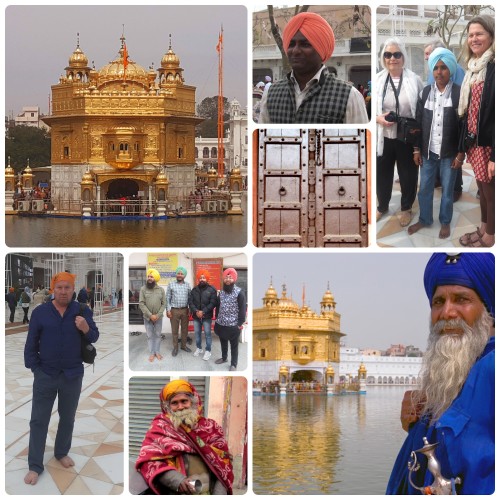“One cannot attain salvation only by showing devotion towards God day and night, that’s not the purpose of life at all. Salvation is attained by performing one’s true duty, by helping those in need, by loving all, by embracing God and all his creations.”―
A later start today and we were glad about that, it meant a leisurely breakfast at the hotel before setting off into the city of Amritsar.
As we joined the coach we were introduced to our guide for the day Jaswinder Singh, a Sikh of course with a broad smile and an untidy beard under a daffodil yellow turban.
The identity of a Lion is not only seen in the Sikh name but in their appearance as well. It is represented through the Five Ks:
(1) Kesh — Sikh men do not cut their body hair. They have long beards, and they tie their hair into a turban. This represents discipline
(2) Kangha — a small comb worn in the hair
(3) Kirpan — every Sikh man has a small dagger or a sword, to protect the weak and fight for justice against tyrants and oppressors. It is forbidden to use it for anything else
(4) Kacchera — a special form of underwear that represents sexual restraint
(5) Kara — a steel bangle representing the infinity of God
As we drove to the city Jaswinder told us a little about Sikhism, it is very complicated as you might imagine but basically it boils down to kindness, family, looking after others and community service. Not something that the people of the World are generally any good at.
The core beliefs of Sikhism, articulated in the Guru Granth Sahib, include faith and meditation in the name of the one creator, divine unity and equality of all humankind, engaging in seva (selfless service),striving for justice for the benefit and prosperity of all and honest conduct and livelihood while living a householder’s life. Following this standard, Sikhism rejects claims that any particular religious tradition has a monopoly on absolute truth.
If all of that is true then these people should immediately put in charge of running the World.
I was reminded that Kim and I once worked with a Sikh man called Navtej Singh and he was probably the nicest, kindest person that we have ever worked with.




Nicely informative
LikeLiked by 1 person
Thank you Derrick.
LikeLiked by 2 people
I only knew that Sikh men wear turbans and everything else was new to me. An excellent post today, Andrew!
LikeLike
Thank you Doug, I appreciate that.
LikeLiked by 1 person
Interesting. I wonder if any of our Tory MPs is a Sikh?
LikeLike
They wouldn’t be eligible to join the nasty party.
Labour MP for Slough ,Tansmanjeet Singh Dhesi is a Sikh
LikeLiked by 1 person
👍
LikeLike
I too have worked with a number of Sikhs and would echo your thoughts.
LikeLiked by 2 people
We have some Sikh friends in Canada and they are wonderful. I’m glad you got to know more about their beliefs.
LikeLiked by 2 people
Thanks for adding Darlene.
LikeLiked by 1 person
Any natural /manmade catastrophe and Sikh organisations are ready with a helping hand.
LikeLiked by 1 person
I was so impressed by the culture.
LikeLiked by 1 person
We would all vote for that.
LikeLiked by 1 person
We certainly would.
LikeLike
Thanks for the information, Andrew. It’s a subject about which I knew very little. Bizarre in some aspects but it would certainly make for a kinder world.
LikeLiked by 2 people